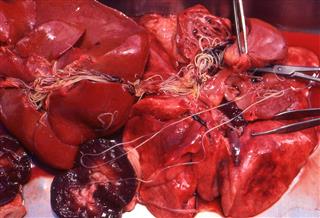
Heartworm is a common and severe canine disease that can even cause your pet’s death. As a dog owner, you need to be well-versed with the symptoms of heartworm infestation to initiate timely diagnosis and treatment.
Heartworm (Dirofilaria immitis) is a parasitic roundworm that is often found residing in the right chamber of a dog’s heart and the two major blood vessels, i.e., the pulmonary artery and vena cava. Heartworm infestation prevents the dog’s heart from functioning properly by blocking the blood vessels.
The disease spreads from host to host through mosquito bites. The mosquito carrying microfilaria (baby heartworms) transfers the infection to a dog’s body when it bites a healthy dog. The heartworm larva migrates to the heart of the dog and after six months it matures to become an adult female heartworm. The female heartworm lays live young microfilaria that circulate through the blood and lead to blood thickening, thus hampering the blood flow.
Symptoms of Heartworm in Dogs
Heartworm infestation brings about a drastic change in the dog’s behavior. It causes irritation in the dog’s heart and blood vessel walls. Heartworms lodge themselves in the liver’s blood vessels, causing liver failure. Heartworm infestation is a serious condition, which can even lead to fatality, and thus, it is important to diagnose it at the earliest. Its symptoms play a crucial role in the diagnosis process.
- Mild Cough: Usually ignored or overlooked by the pet owner, a mild cough is the first symptom of various dog illnesses, including heartworm infestation, and should be taken seriously.
- Fatigue: Any form of fatigue is a sign of the dog suffering from infestation by heartworms. If your dog doesn’t show an active interest in playing, feels like lying down after climbing the stairs, or gets tired easily, it may mean that he has been infected by the parasite.
- Breathing Difficulties: If your dog seems to be short of breath and is gasping or gulping for air, take him to the veterinarian as it may be a sign of a serious illness.
- Severe Coughing:A severe, deep-chested cough is another important symptom observed in dogs who may be suffering from heartworm infestation.
- Loss of Appetite and Weight Loss: Loss of appetite and weight loss are other important symptoms which are usually ignored by most pet owners. Sudden loss in weight or a long period of disinterest in food can be due to heartworms, and hence, should not be ignored.
- Jaundice: Jaundice occurs when the liver has been infected, and if your dog is suffering from jaundice, it may mean he is extremely ill. In such a case, surgery will be required to get rid of heartworms.
Treatment for Heartworm Infestation
Chemical therapy is the answer to this problem. As the treatment involves the use of chemicals, it is best left to a veterinarian. It may so happen that dead worms may get deposited in the lungs, which may have adverse effects on the dog’s health. If the condition is diagnosed in the initial stages, the veterinarian will prescribe medication to destroy the microfilaria inside the dog’s body before it grows into adult heartworms. Surgery can be another treatment option but is usually done only when the infection becomes severe or reaches the last stage.
If you observe any of these symptoms, don’t ignore them. Immediately take your dog to the veterinarian, as an early diagnosis will save your dog from chronic heart failure and related life-threatening complications. You can also resort to preventive measures to maintain your dog’s health like keeping the dog’s sleeping area clean, using repellent sprays, or using prescribed preventive medication.



